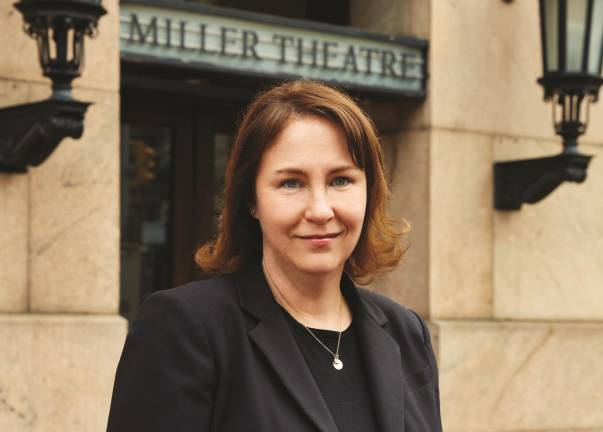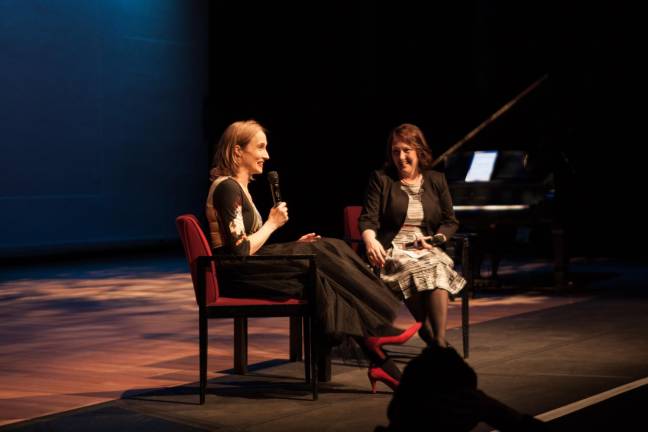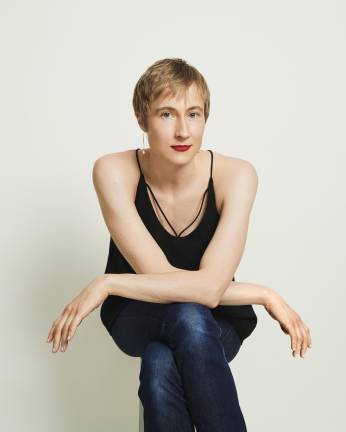'You Can Have a Different Ending to the Story'
At Columbia University's Miller Theatre, Executive Director Melissa Smey brings people together for contemporary music in innovative ways



Modern audiences often think that classical music is too difficult to understand, too expensive or too elitist for their taste. Columbia University's Melissa Smey is out to change these perceptions. As the Associate Dean and Executive Director of Columbia University's School of the Arts, Smey programs contemporary classical music at Columbia's Miller Theatre by luminaries such as Missy Mazzoli, Chaya Czernowin and John Zorn. As the executive director, Smey has presented this music in innovative ways that not only draws in new audiences, but also makes the concert-going experience more enjoyable for everyone. We sat down last week with Smey to talk about pop-up concerts, gender parity and Miller Theatre's upcoming production of "Desire," a new opera by composer Hannah Lash.
What makes Miller Theatre unique? What is its unique contribution to New York's cultural scene?
That is a great first question. What I strive for in all of the programming at Miller is to create unique experiences that people can't have anywhere else. We're a campus-based presenting organization, and that is a model that exists on lots of university campuses all across the country. So that is in fact not unique to Columbia University, but what is unique is that Columbia University is in the city of New York, and it's an incredibly vibrant and rich cultural landscape. We made a strategic decision pretty early on that it wouldn't make sense to be the fourth best recital series, or the second best string quartet series. In New York City, you can have the very best of everything. And so we strive to create experiences you can't have anywhere else.
In our contemporary music programming, our composer portrait series is celebrating its 20th anniversary this year, and two years ago, I launched a new chamber opera commissioning initiative. And we're coming up very soon on the world premiere of the second opera that we commissioned as part of that initiative. And I think that really speaks to Miller's strengths in working with living composers and supporting their work, and connecting it with audiences.
For many people, new music is unfamiliar territory. How do you connect general audiences to new music in fresh, creative ways?
Audience development is extremely important, and it's something that is a personal passion of mine in helping to connect people. Music and classical music shouldn't just be for special occasions, right? It can be very special, but I think music, and the arts more broadly, should be a part of everybody's everyday life. There's a sense that classical music is hard to understand, or isn't welcoming. I understand why people would form that impression, and I strive in everything we do at Miller Theatre to make that not be the case.
And so I started a series in 2012 called the pop-up concerts. They're free and open to the public. They're at 6 o'clock. They're short; they're about 45 minutes. We have free beer and free wine, so you can mingle with your friends and have a drink. And then the audience and the performers are seated on the stage, so it's really intimate. There are no printed programs, so there isn't the formality of a piece of paper you're supposed to be looking at. We've found that more than half the attendees are coming to Miller Theatre for the first time. I think it's a really great way to come and experience something new. And it's super low stakes, right? Because it's free. You didn't paying anything. It's an hour of your time. And if you didn't like it, that's ok. But if you did like it, you'll come back.
Do you reach out to the people in the neighborhood outside of the Columbia University campus?
Absolutely. We love our neighbors. In addition to the music programming that we offer, I also oversee the university's Arts Initiative. And so Miller Theatre [and] Arts Initiative partner together every fall. We have this incredible project called Morningside Lights. We launched that in the fall of 2012 with the idea of connecting the neighborhood, connecting the campus, and actually getting people into Miller Theatre. We work in collaboration with Processional Arts Workshop. The two artists who run that actually are the artists who do the big large-scale puppets every year in the Greenwich Village Halloween Parade. And so there are a week of hands-on workshops where volunteers sign up to come and make lanterns. We literally turn the stage into a lantern-making workshop. And then there's a procession that starts in Morningside Park, and then travels back to the campus.
A female composer wrote "Desire," the next opera you are presenting. How do issues like gender parity and inclusion come into play when programming your season?
It's not interesting to be the woman executive director who programs music by a bunch of women composers, right? That's not an interesting story. I want to work with excellent world-class composers. But I do think there are a lot of composers whose work isn't well represented in other spheres of classical music. And so I've kind of quietly made a commitment of working with lots of women composers. But I think the important emphasis is that it's about working with really amazing composers.
How did you get involved with the arts? Where did your journey start?
I started playing the flute in the fifth grade. I loved it. I would play my flute literally for hours. And I had flute records, and I would play along with the records. My parents had this collection of Readers' Digest Treasury of Classical Music Albums on a record player, and I loved Scheherazade and I loved Ravel. I studied music as an undergrad at the University of Connecticut, and I had this really amazing opportunity to work at the concert hall there. And had a mentor there, Susan Holmes, who was running it. So I worked for her in the box office for a while. She actually helped me to figure out that my gifts lie in the producing side of things, rather than on the performing side.
What role do the arts play in today's society?
Artists can help people imagine things to be different than they are. And I think that's really powerful. That you can have a different ending to the story. Or just imagine things to be different than they are. With classical music, what I find so beautiful about it is in an increasingly digital society, classical music is the ultimate analog experience. You come together in a room with a lot of other people, and have that communal experience of sitting together and listening to music that musicians have prepared to share with you, that everyone is experiencing in the same moment together. I think there aren't so many opportunities where people are doing that anymore.
This interview has been edited and condensed.